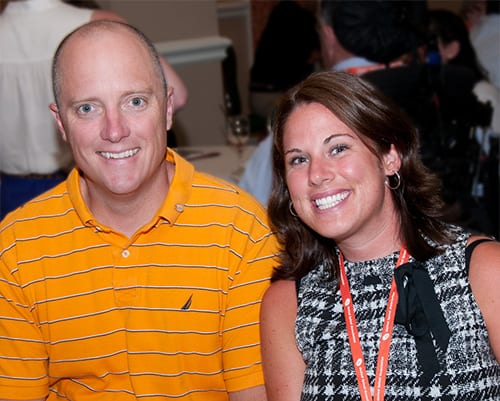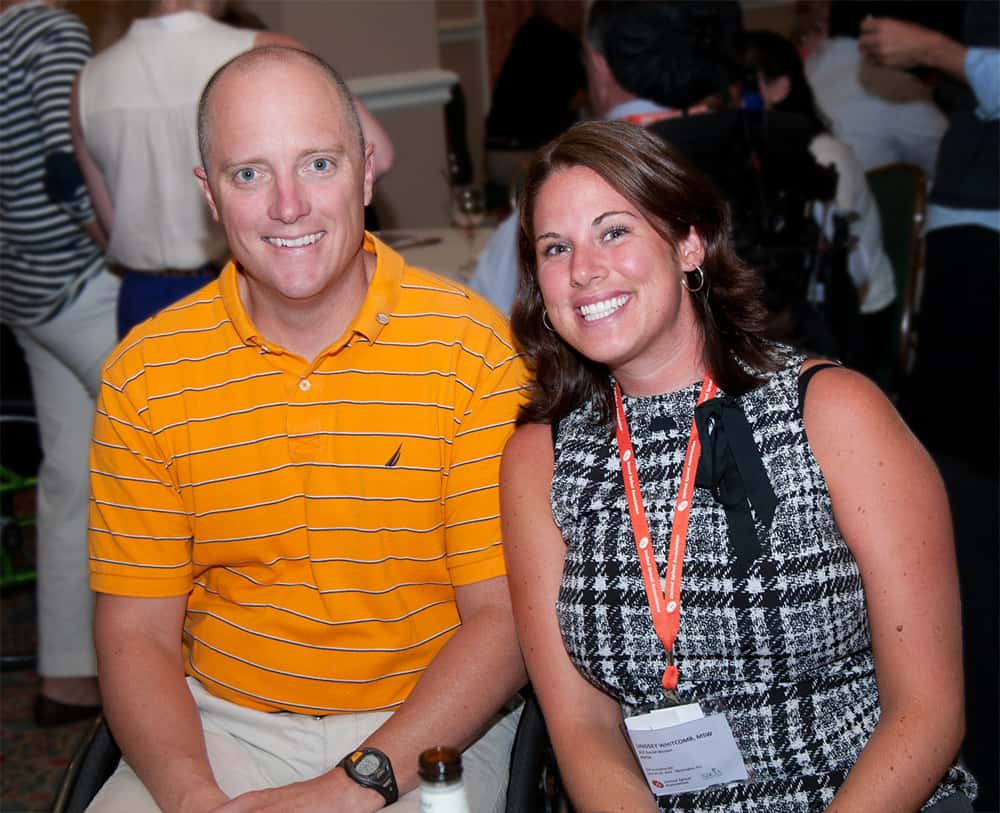
From June 23-26, 2019, United Spinal Association members from around the country will be descending on Washington, D.C., for the eighth annual Roll on Capitol Hill. Roll on Capitol Hill is the organization’s yearly legislative advocacy event where people from the SCI community take over our nation’s capital to educate legislators on the issues that affect them and advocate for policies to help them.
NEW MOBILITY caught up with two Roll on Capitol Hill veterans and two newbies who will be making their first trip this June to find out what they are looking to achieve and what they hope to tell their members of Congress when they get behind closed doors.
Community Empowered
Shannon Minnick, 48, Silver Spring, Maryland
For Shannon Minnick, life as a C6-7 quadriplegic occasionally felt lonely and isolating, like she was navigating the haze of life with a spinal cord injury alone and in silence. But being among the many wheelchair users who attended the Roll on Capitol Hill in 2018 reminded her that she’s part of a larger historical tapestry — one with a booming collective voice.

Minnick is the former Miss Wheelchair Maryland 2010 and current director of Independent Living Services at Independence Now, a center for independent living in Silver Spring, Maryland. She is returning to Roll on Capitol Hill in 2019 to emphasize the importance of preserving programs like Maryland’s Employed Individuals with Disabilities, which allows working people with disabilities to qualify for Medicaid.
“Sometimes I think people with disabilities aren’t considered people who work and have families and children. I live my life independently, so just to be in a room with so many individuals who knew my story was powerful right there,” says Minnick. “Then to go out on Capitol Hill and talk about our issues and the things that are important to us — it’s overwhelming, it’s scary, but it’s also powerful.”
Being with fellow SCI community members gave Minnick the strength to speak to members of Congress directly. She believes the unity of the group made its message even more powerful. “You go into these things and sometimes you’re shy because of who you’re talking to, but when you go in as a group, it’s awesome because someone always steps in if you leave something out,” she says. “We all need to come together because the things that I need are also things that someone with cerebral palsy needs. They need catheters, they need personal care attendants, they need wheelchairs, so we should all be harmonizing together toward the same goals.”
The 2018 Roll on Capitol Hill gave Minnick a sense of community that stayed with her long after leaving the event. Seeing what her new advocate friends were doing on social media sustained her when times were tough and inspired her to continue her own efforts throughout the year. “[The Roll on Capitol Hill] gives me hope,” she says. “It tells me that the work I do every day at our independent living center is not in vain. People are living, people are striving — and that’s important to me.”
Now as she prepares to return, Minnick hopes her participation will inspire more people with disabilities in her community to take action. “If you want something to change, you have to be a part of the process,” she says. “I can’t complain that I need Medicaid and they won’t give it to me because I only make a certain amount a year and then sit at home and do nothing. I have to get out there and fight for that and say, ‘this is why I need it.’”
Fighting to Keep Moving Forward
Adam Lane, 46, Oklahoma City, Oklahoma
Despite being relatively healthy with a good job and great insurance benefits, Adam Lane finds his access to complex rehab technology dwindling and the cost of managing his own healthcare as a T10-11 paraplegic rising. “Catheters have been a big expense. Sometimes they’re covered by my private insurance and sometimes they’re not. I have a baclofen pump for my spasticity and it’s very expensive to refill every year. Every time you see a doctor there’s a co-pay, so I can spend $1,000 or $2,000 for my annual follow-up visits,” says Lane.

This is one of the reasons the former paramedic and current mobility specialist is returning to the Roll on Capitol Hill. He also has concerns regarding access to the built environment. He lived in Kansas City, Missouri, and says it was quite accessible, “but it’s been eye-opening moving to Oklahoma and seeing the lack of accessibility in public spaces. Even new projects aren’t entirely accessible. They just opened a new streetcar track in Oklahoma City and only 16 of the 20 streetcars meet ADA compliance.”
Tired of being an afterthought, Lane hopes to talk to his representatives about the importance of including those with disabilities when it comes to infrastructure planning. He believes many of the accessibility issues in Oklahoma City could have been easily rectified if decision makers had put more thought into them or just included wheelchair users in finding creative solutions. “People think we are being overly sensitive when all we want is to use the public facilities that are available to us. We need to be able to be there, on the ground, so we’re not looked at as some whiny people looking to create causes and hurt small businesses. We just want to go where everyone else goes — it’s vitally important,” says Lane.
Though he has seen an ebb and flow of positive legislation around disability issues since he last attended the Roll on Capitol Hill, he still believes in the importance of direct political action. “The whole reason I got involved with United Spinal Association is because I had a very supportive network and very good insurance prior to my injury and I realize not everybody has that, so I believe it’s my responsibility to ensure others get the kind of benefits and support that I’ve been able to reap.”
From YouTube to D.C.
Cole Sydnor, 24, Richmond, Virginia

If you’re one of their 150,000 subscribers, you’ve probably already heard of Cole Sydnor and his girlfriend Charisma from the Roll with Cole and Charisma YouTube channel. The C5-6 complete quadriplegic and his partner use their videos to document political activism within the disability community as well as to provide an ongoing warts-and-all look at their own interabled and interracial relationship. It’s all part of their effort to lift the veil on life with a disability. “The Roll on Capitol Hill is a great opportunity to raise awareness about disability issues, show people how many of us are out there and demonstrate how we really do care about our rights,” says Sydnor.
In addition to giving their viewers an inside look at Roll on Capitol Hill, Sydnor hopes to help the Sheltering Arms Foundation raise money for what will be the only hospital in the Richmond, Virginia, area offering expert therapies for SCI. “When I first got injured I had to go down to Atlanta, Georgia, and I was really far away from my support system,” says Sydnor. “I don’t want anyone to go through that at such a critical time.”
Raising Awareness
Joe Gavic, 47, Dallas, Texas
When Joe Gavic lived in Milwaukee, he knew where all the SCI resources were and how to take advantage of them. Then he moved to Dallas and found himself in unfamiliar territory, where finding and connecting with needed resources was not easy.

To start addressing that problem, he founded the North Texas Chapter of United Spinal Association in 2018. Its primary role is to connect those with SCI to the little-known services that are available to them. “We’re publicizing all sorts of things — anything from recreation, to lifestyle, to education, to awareness, advocacy and arts,” says Gavic. “All of those things are available to our consumers. Yet, not all our consumers know about them.”
For him, the Roll on Capitol Hill is a networking and awareness opportunity that cannot be missed. “Our immediate goals for Roll on Capitol Hill are to go and get exposure and to let our legislators know that there’s an organization that is new, that is out there and looking to promote greater advocacy and greater awareness for the consumers in our area,” says Gavic.
*****
For more information about the Roll on Capitol Hill, or to find out how to get involved, visit unitedspinal.org/events/roll-on-capitol-hill
Support New MobilityWait! Before you wander off to other parts of the internet, please consider supporting New Mobility. For more than three decades, New Mobility has published groundbreaking content for active wheelchair users. We share practical advice from wheelchair users across the country, review life-changing technology and demand equity in healthcare, travel and all facets of life. But none of this is cheap, easy or profitable. Your support helps us give wheelchair users the resources to build a fulfilling life. |


Recent Comments
Bill on LapStacker Relaunches Wheelchair Carrying System
Phillip Gossett on Functional Fitness: How To Make Your Transfers Easier
Kevin Hoy on TiLite Releases Its First Carbon Fiber Wheelchair